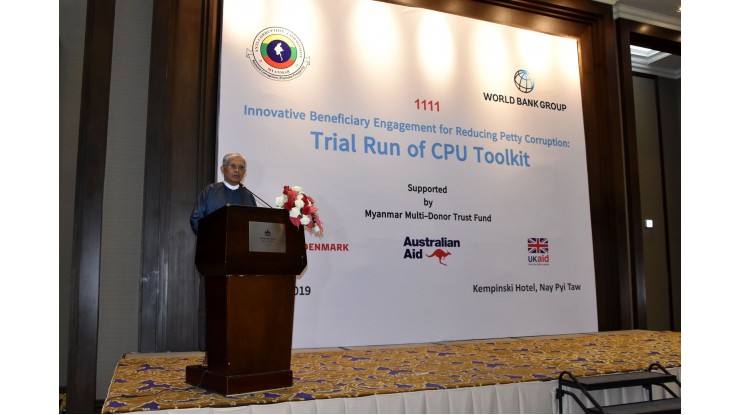အသေးစားအဂတိလိုက်စားမှုလျော့ချရေးအတွက် CPU Toolkit စမ်းသပ်ဆောင်ရွက်ခြင်း အခမ်းအနားတွင် ကော်မရှင်ဥက္ကဋ္ဌပြောကြားသော အမှာစကား
- Thu, 10 October 2019

အသေးစားအဂတိလိုက်စားမှုလျော့ချရေးအတွက် CPU Toolkit စမ်းသပ်ဆောင်ရွက်ခြင်း အခမ်းအနားတွင် ကော်မရှင်ဥက္ကဋ္ဌပြောကြားသော အမှာစကား
နေရာ။
နေပြည်တော်။
ရက်စွဲ။ ၉-၁၀-၂၀၁၉။
၁။ နှုတ်ခွန်းဆက်သခြင်း။
၂။
ရှေးဦးစွာ ကျွန်တော်တင်ပြလိုတာကတော့ ကမ္ဘာဘဏ်အဖွဲ့၏ Innovative
Beneficiary Engagement အစီအစဉ်ကို မြန်မာနိုင်ငံတွင်
အသေးစားအဂတိလိုက်စားမှုလျှော့ချရေး CPU Toolkit အဖြစ်အသုံးပြုရန်
ကော်မရှင်က စတင်လက်ခံရယူဆောင်ရွက်ခဲ့ပါကြောင်း ဖော်ပြလိုပါသည်။ CPU
Toolkit သည် ဒေသဆိုင်ရာရုံးဌာနခွဲတစ်ခုတွင် ဝန်ဆောင်မှုကိုရယူရန်လာရောက်သော
အခြေခံပြည်သူတစ်ဦးအား ပြည်ထောင်စုဝန်ကြီးရုံး သို့မဟုတ် နေပြည်တော်ရှိ
ရုံးဌာနချုပ်မှ အဂတိလိုက်စားမှုတားဆီးကာကွယ်ရန် တာဝန်ရှိသောအရာရှိတစ်ဦးက
လက်ကိုင်ဖုန်း မှ တဆင့် SMS ဖြင့် အဆက်အသွယ်ရယူခြင်း၊
ရရှိသောဝန်ဆောင်မှုအခြေအနေကို စုံစမ်းမေးမြန်းခြင်း နှင့် ယင်း
အခြေခံပြည်သူအတွက် လိုအပ်သောအကူအညီကို ဖြည့်ဆည်းပေးခြင်း စသည်တို့ဖြင့်
အောက်ခြေရုံး/ဌာနများတွင်ဖြစ်လေ့ရှိသော အသေးစားအဂတိလိုက်စားမှုများကို
မဖြစ်ပေါ်လာ စေရန် ကြိုတင်တားဆီးကာကွယ်ပေးသော
လက်သုံးကိရိယာတစ်ခုဖြစ်ပါသည်။ ဤကိစ္စနှင့် စပ်လျဉ်း၍ CPU Toolkit သည်
အခြေခံပြည်သူတစ်ဦးနှင့် ဌာနဆိုင်ရာတာဝန်ရှိသူအကြား၊
ဝန်ဆောင်မှုအပေါ်အကြံပြုချက်ရယူရန်
ချိတ်ဆက်ပေးသောယန္တရားတစ်ခုသာလျှင်ဖြစ်ပြီး တည်ဆဲ တိုင်ကြားမှုယန္တရားကို
အစားထိုးခြင်း သို့မဟုတ် ထပ်မံဖြည့်စွက်ခြင်း လုံးဝမဟုတ်ပါကြောင်း
ရှင်းရှင်းလင်းလင်းပြောကြားလိုပါတယ်။ ဤလက်သုံးကိရိယာသည်
အဂတိလိုက်စားမှုတိုက်ဖျက်ရေး အတွက်သာမက တာဝန်ယူမှုရှိခြင်း၊
ပွင့်လင်းမြင်သာမှုရှိခြင်းနှင့် တုံ့ပြန်ဖြေကြားရခြင်းဟုဆို သည့်
နိုင်ငံတော်အစိုးရ၏ ကောင်းမွန်သောအုပ်ချုပ်ရေးစနစ်အတွက်
မရှိမဖြစ်အင်္ဂါရပ်သုံးချက် ကိုလည်း ဖြည့်ဆည်းပေးပါသည်။
၃။
ယခုအခါ ပြည်ထောင်စုဝန်ကြီးဌာန( ၁၇ )ခုနှင့် ပြည်ထောင်စုအဆင့်အဖွဲ့အစည်း
( ၅ )ခုတွင် CPU ( ၃၇ ) ခု ဖွဲ့စည်းပြီးဖြစ်သည့်အပြင် ယင်း CPU
များအတွက် ရည်မှန်းချက်တာဝန်(၃)ရပ်၊ လုပ်ငန်းစဉ် (၆) ချက်တို့ကိုလည်း
ချမှတ်ထားပြီးဖြစ်ပါသည်။ ယနေ့မှစတင်၍ အရေးကြီးသော ဝန်ကြီးဌာန(၁၀)ဌာနမှ CPU
များသည်CPU Toolkitများကို မြို့နယ်တချို့တွင် စတင်စမ်းသပ်
ဆောင်ရွက်သွားမည်ဖြစ်ရာ ဝန်ဆောင်မှုရယူသော ပြည်သူတစ်ဦးချင်းထံသို့
သက်ဆိုင်ရာ CPU က SMS မှတဆင့် ဆက်သွယ်စုံစမ်း မေးမြန်းခြင်းနှင့်
ဖြည့်ဆည်းပေးခြင်းတို့ကို ဆောင်ရွက်သွား မည်ဖြစ်ပါသည်။ ကျန် CPU များကလည်း
မကြာမီကာလအတွင်းမှာပင် စတင်၍ စမ်းသပ် ဆောင်ရွက်နိုင်ရန်အတွက်
ကြိုးစားအားထုတ်လျက်ရှိနေကြပါသည်။ ယခုကဲ့သို့ CPU များတွင် ဤ
လက်သုံးကိရိယာကို ထိထိရောက်ရောက်သုံးစွဲနိုင်ရန်အတွက် ကမ္ဘာဘဏ်အဖွဲ့မှ
လူအင်အား၊ ငွေအင်အား၊ နည်းပညာအင်အားများစိုက်ထုတ်လျှက် စွမ်းအားပြည့်
အကူအညီ ပေးနေသည်ကို တွေ့ရှိရသည့်အတွက် ပြည်ထောင်စုဝန်ကြီးဌာနများနှင့် CPU
များကိုယ်စား ကော်မရှင်က အထူးကျေးဇူးတင်ရှိပါကြောင်း ပြောကြားလိုပါသည်။
အလားတူပါပဲ ကမ္ဘာ့ဘဏ်အဖွဲ့နှင့်အတူ (Multi-Donor Trust Fund) အစီအစဉ်အရ
စေတနာထက်သန်စွာ အားပေးကူညီကြသော အဖွဲ့ဝင်နိုင်ငံများနှင့်
အဖွဲ့အစည်းများကိုလည်း ကျေးဇူးတင်ရှိပါသည်။
၄။
အဂတိလိုက်စားမှုတိုက်ဖျက်ရေးလုပ်ငန်းစဉ်တွင် " တားဆီးကာကွယ်ခြင်း "သည်
တရားစွဲဆို အရေးယူဆောင်ရွက်ခြင်းထက် များစွာ ပိုမိုထိရောက်မှုရှိပါသည်။
နိုင်ငံ့ဝန်ထမ်းများအား ရာဇဝတ်မှုမဖြစ်ပွားမှီ
ကြိုတင်တားဆီးကာကွယ်နိုင်ခြင်းဖြင့် သက်ဆိုင်သူတစ်ဦးချင်းစီအတွက် သာမက
နိုင်ငံတော်အတွက်ပါ ထိခိုက်နစ်နာမှုကို နည်းပါး သက်သာစေပါသည်။ CPU များ
အလုပ်မလုပ်နိုင်လျှင် ဝန်ထမ်းများကို တားဆီးကာကွယ်မှု
လုံလောက်စွာမလုပ်နိုင်သဖြင့် တိုင်ကြားခြင်း၊ စစ်ဆေးခြင်းနှင့်
တရားစွဲဆိုခြင်းခံရရန် အလားအလာ ပို၍များနိုင်သည်ကိုလည်း သတိပြုသင့်ပါသည်။
ထို့ကြောင့် ဝန်ကြီးဌာနများတွင် CPU များကို ကောင်းစွာ အလုပ်လုပ်နိုင်ရန်
အတွက် တာဝန်ရှိသူများနှင့် ဝန်ထမ်းများက မိသားစုစိတ်ဓာတ်ဖြင့်
စေတနာထားပြီး ဝိုင်းဝန်း ကူညီပေးကြပါရန် အလေးအနက် မေတ္တာရပ်ခံလိုပါသည်။
၅။
အဂတိလိုက်စားမှုတိုက်ဖျက်ရေးလုပ်ငန်းသည်
ဒီမိုကရေစီအသွင်ကူးပြောင်းခဲ့သည့် ဖွံ့ဖြိုးဆဲ နိုင်ငံများတွင်
ပြန်လည်ထူထောင်ရေးနှင့် နိုင်ငံဖွံ့ဖြိုးတိုးတက်ရေးတို့အတွက် မဖြစ်မနေ
ဦးစားပေး လုပ်ဆောင်ရသည့် ပြုပြင်ပြောင်းလဲရေးလုပ်ငန်းတစ်ခုဖြစ်ရာ
မိမိတို့နိုင်ငံတွင် ထိခိုက်နစ်နာမှု အနည်းဆုံးဖြင့် အဂတိလိုက်စားမှုကို
အောင်မြင်စွာတိုက်ဖျက်နိုင်စေရန်ရည်ရွယ်၍ ကော်မရှင်သည် ပညာပေးခြင်းနှင့်
တားဆီးကာကွယ်ခြင်းလုပ်ငန်းတို့ကို တရားစွဲဆိုအရေးယူဆောင်ရွက်ခြင်း
လုပ်ငန်းထက် ပို၍အလေးပေး ဆောင်ရွက်နေခြင်းဖြစ်ပါသည်။ CPU Toolkit သည်
လူထုကို ဗဟိုပြုသော
ပြည်သူ့ဝန်ဆောင်မှု၏အစိတ်အပိုင်းတစ်ခုဖြစ်လာလိမ့််မည်ဟုလည်း
မျှော်လင့်ထားနိုင် ပါသည်။ လူထု၏လိုအပ်ချက်နှင့်
ဦးစားပေးမှုတို့ကိုနားထောင်ပြီး လူထုစိတ်ကျေနပ်မှုရအောင်
လွယ်ကူလျှင်မြန်စွာ ဖြည့်ဆည်းပေးနိုင်သောကိရိယာဖြစ်ပါသည်။ CPU များက
စေတနာရှိလျှင် ရှိသလောက် ပြည်သူလူထု၏စိတ်ကျေနပ်မှု ရရှိလာမှာဖြစ်ပါသည်။
သို့သော် ဤစနစ်၏ အောင်မြင်မှုသည် သက်ဆိုင်ရာဌာနအကြီးအမှူးများ၊ CPU များ၊
လက်အောက်ရုံးခွဲများနှင့် ပြည်သူလူထုကြီး တစ်ရပ်လုံးက အဂတိလိုက်စားမှုကို
လုံးဝသည်းမခံ၊ ခွင့်မလွှတ်သောစိတ်ဓာတ် (zero tolerance)ဖြင့်
ပူးပေါင်းပါဝင်မှုရှိခြင်းဆိုသည့် အချက်အပေါ်တွင်သာ အဓိကမူတည်နေ
ပါကြောင်းတင်ပြရင်း နိဂုံးချုပ်အပ်ပါသည်။







